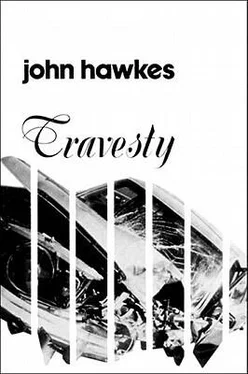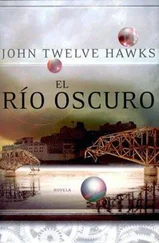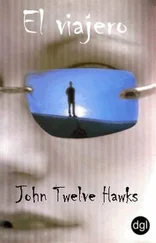But why, you ask, why this terrible and at the same time humorous correspondence between physical building and human occupant? The answer is obvious: it is simply that there is no difference between the artist, the architect, the workman, the physician, the bloody victim and the cook slicing his cabbage. One and all they share our national psychological heritage. One and all they are driven by the twin engines of ignorance and willful barbarianism. You nod, you also are familiar with these two powerful components of our national character, ignorance and willful barbarianism. Yes, everywhere you turn, and even among the most gifted of us, the most extensively educated, these two brute forces of motivation will eventually emerge. The essential information is always missing; sensitivity is a mere veil to self-concern. We are all secret encouragers of ignorance, at heart we are all willful barbarians.
But indeed, these qualities also account for our charm, our good humor, our handsome physiques, our arrogance, our explosive servility. We are as we wish to be. We would have it no other way. Our national type is desirable as well as inescapable. You and I? You and I are two perfect examples of our national type.
The reason we make such a perfect pair, such an agreeable match, is that you are a full-fledged Leo, while through the marshes of my own stalwart Leo there flows a little dark rivulet of Scorpio. You were unaware of it? But then naturally you could not have suspected anything of my Scorpio influence since I deliberately though casually concealed even the slightest shade of that all-too-suspect influence from your detection. You see how capable I am of deception, at least of any deception which in my judgment is for our mutual good. But thus we have one more scrap to toss on the heap of our triumphant irony. Because in our case it now appears that the poet is the thick-skinned and simple-minded beast of the ego, while contrary to popular opinion, it is your ordinary privileged man who turns out to reveal in the subtlest of ways all those faint sinister qualities of the artistic mind. Yes, you are the creature who roars in the wind while I am the powerful bug on the wall. But you are not interested? You are not amused? And yet if only you would pause a moment to think, cher ami, then you would realize that behind my coldest actions and most jocular manner there lies not hostility but the deepest affection. After all, my Scorpio influence inspires me to unimaginable tenderness.
I applaud the dark night. I love the darkness. Not merely for regressive pleasures: for comfort, security, the peace of the dream. No, I am much too active a person to stop with mere sensual immobility, though I am not at all denying my proclivities in that direction as well. No, it is simply that the night is to my eye as is the pair of goggles to the arc-welder. Through the thick green lens of the night I see only the brightest and most frightening light.
For instance, the cemetery we are about to pass- yes, a cemetery, as luck would have it, along with the
rabbit and gentle syncopation of the muted jazz which, at this moment, naturally intensifies and quickens-the cemetery we shall shortly pass is already clear to my eye, brilliant, rock-hard, motionless. You would see nothing even if you looked, so don't bother. I see quite well enough for the two of us. At any rate the ceme- tery-and now, as a matter of fact, we are abreast of it, just there on the left-the cemetery stands now before my eyes, small, rising in tiers, a very old and typically well-ordered arrangement of crosses and crypts and mausoleums of black marble, white marble, some kind of deep gray stone, and it is quite as if we were staring at that small village of the dead (the likeness is most appropriate, cher ami) from a stationary vehicle parked in our empty wind-blown, golden field directly across from that small, excellent example of our morbid artistry. Yes, that is precisely how totally and clearly I see our cemetery, thanks to the night. And there is sunlight but no sun, a quality of deadened daytime colors that could only be perceived in the blackest and, I might add, the wettest of nights. The white vases, the red flowers composed of wax, the sagging ribbons, the tiny photographs that might have been stripped from an album depicting all the participants in the last great war, and the rows of gravel and little barred windows and stone rectangles constructed to the dimensions of the human body, and, thank goodness, not a single mourner to be seen in that entire conglomerate of piety and bad taste-well, now you have an idea of the true reason I so enjoy driving at night. It is not merely because the roads are generally unused at night. Not at all.
But was that cemetery somewhat familiar to you, cher ami? It should have been.
Silence. The bird in flight. Silence falling between driver and passenger who find themselves deadlocked on a lonely road, deadlocked in their purposes, deadlocked between love and hatred, memory and imagination. But you need not bother to raise your chin, turn your head, rouse yourself from all your afflictions into unhappy speech. I know what you are thinking. I could not agree more heartily. Silence is what we are after, you and I. Silence. I long for it also. You are not alone.
We will not be denied. After all, we are now on the near edge of recklessness, it is no longer even a question of time to spare, and beyond us the trees are dying, the tiny shoots are turning a bright green, the landmarks are falling to the left and right of us so quickly that their significance is fading in direct proportion to our mounting preoccupation with ourselves, with what is to come. Yes, silence is consuming sight.
The moral of it all is trust me but do not believe me-ever. Why, even as I deny the fleeting landmarks I cannot help but call your attention to that small church set back from the road in that clump of naked trees on our right. Naturally the church has nothing to do with the cemetery. The cemetery is already far, far behind us. It is gone. No, this is the church that is guarded by the old crone who tends the place with her cane and dog. She is an insufferable old creature who tried to frighten me away the very afternoon I stopped and strolled about and committed the landmark of her ugly little church to memory. She has a beautiful cough, I can tell you that. And I knew at once that she was no more taken in by the weedy sanctity of the little church and mutilated calvary than was I. At any rate I had only an objective interest in the steeple, as a point of essential reference, and a personal interest in the fountain which I knew I would discover in the tall grass behind the church.
The fountain was there, as I knew it would be. And just think, according to local legend it was the Fountain of Clarity. You can imagine how pleased I was to stand in the last of the sun with this precise moment of our dark passage fixed in my mind-hearing the rain, the engine, the tires, seeing our lights-and at the same time to lean forward and regard my own face in the little pool of water that lies in the depths of the Fountain of Clarity. Its ancient artisan could not have known that one day a privileged man such as myself would so admire his work. The creators of that ancient legend could not have known that I have never expected anything at all from my life except clarity. I have pursued clarity as relentlessly as the worshipers pursue their
Christ. And there I stood, noting the algae in the bottom of the pool, the paleness of the still water, the rough ingenious construction of the fountain hidden in the tall grass. It was a pleasing coincidence. But my own face, our dark night that was as real to me as it is this moment, the automobile that was awaiting me on the dirt road in the shadow of the wretched calvary-it was nothing, nothing at all compared with the intensity with which I was then contemplating the existence of our own Honorine. Your Muse, my clarity, I cannot convey to you my satisfaction as the thought of Hon- orine filled the silence of an earthly spot which, except for the fountain, was otherwise perhaps a little too picturesque. But if I had ever worn a wedding band, an idea which for me has always been distasteful, certainly I would have removed it then and dropped it as an offering into the cold pool where the cows drank and the old woman filled her jugs and bottles.
Читать дальше












